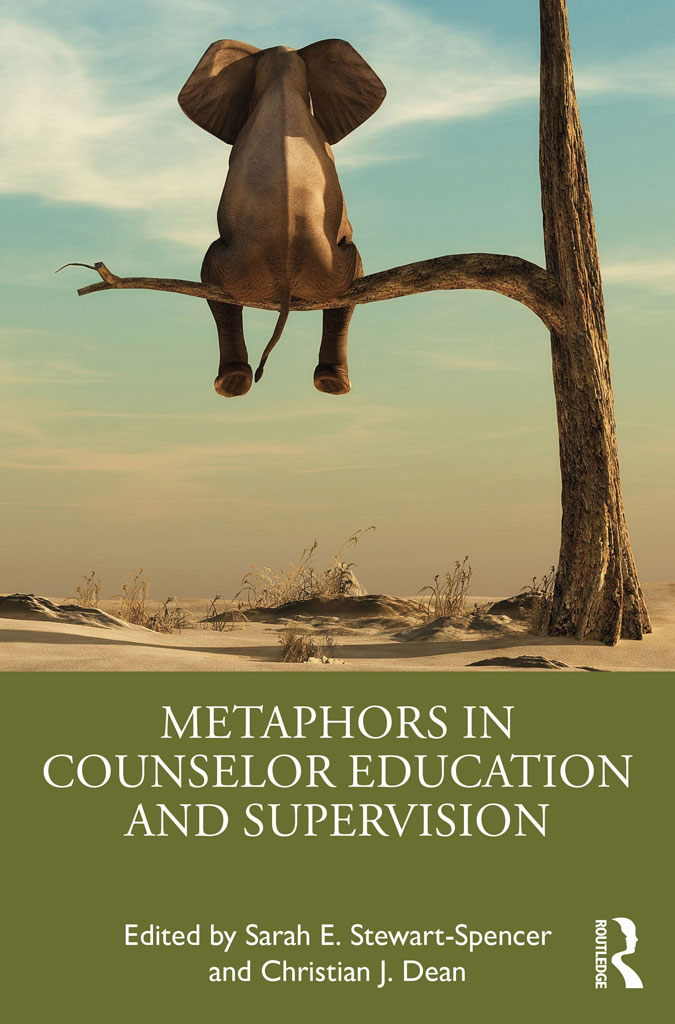Yorkville University’s Dr. Sarah Stewart-Spencer is about to publish her second book on metaphors.
Metaphors in Counselor Education and Supervision, which is set to be released by Routledge Press on Nov. 23, is a teaching and supervision guide that provides counsellor educators and supervisors with creative metaphors to help their students understand abstract clinical concepts and foundational skills.

“A lot of it is about helping people in the profession grasp concepts that are very hard to see sometimes because they’re so ambiguous and very grey,” said Stewart-Spencer, Yorkville’s Dean of Behavioural Sciences.
Concepts included in the 256-page book, which was co-edited by Christian J. Dean, range from case conceptualization, self-care, and the counselling process, to countertransference, suicide assessments, and advocacy.
“The hope is that this book helps you grasp these concepts and have better insight into your clients,” Stewart-Spencer explained, noting that each metaphor in the book is also accompanied by ethical and cultural considerations, group supervision modifications, and alternative uses to help emphasize diversity and ethics.
Metaphors in Counselor Education and Supervision is Stewart-Spencer and Dean’s much-requested follow up to their 2016 text, Metaphors and Therapy: Enhancing Clinical Supervision and Education.
Stewart-Spencer said that first book was inspired by a conversation she had with Dean in which the two traded metaphors.
“We were both doing clinical training at the time, and we both found out that when we used metaphors in that training, people tended to grasp the concepts faster and progress more quickly,” she said.
“So, we asked each other what metaphors we were using and started writing them all down. When we started putting them together, we stopped and said, ‘Hey, if we have and use these metaphors, I bet everybody has some metaphors they use as their go-to thing, too.’”
Soon after that conversation, they put a call out for submissions across all their different channels for counsellor educators – and the response they got was overwhelming.
That first book, in fact, included contributed metaphors from a total of 34 different counsellor educators and supervisors from all across North America – many of whom reached out to Stewart-Spencer and Dean after its publication with more metaphors to share. From there, it only seemed natural to Stewart-Spencer and Dean to follow up with a second offering.
With the second book, Metaphors in Counselor Education and Supervision, Stewart-Spencer said she and Dean had another 33 contributors representing 20 different major North American universities across the profession.

Stewart-Spencer helped author three of the book’s 25 chapters:
– Chapter 12 – Roots Not Leaves: Navigating Clinical Focus and Treatment Planning
“This is a metaphor that explains how counsellors often get so distracted by the superficial parts of their client’s story (the leaves), that they don’t look deeper to the themes (the roots) behind them. It explains that if you just address that root, then the whole tree could become restored. But if you take one tiny leaf off at a time, then the client is going to come back to you every time they have a leaf – and that creates dependency.”
– Chapter 13 – Ocean of Emotion: Exploring the Therapist Role and Countertransference
“This one is one of my favourites, and it’s basically about our responses, as counsellors, when we first get into the field and have a client who is drowning in emotion and feeling like they really need you to rescue them. But the reality is that, when we become a rescuer or a “lifeguard,” then we’re stealing from the client, because then the client won’t learn how to swim on their own.”
– Chapter 23: Connect Through the Door of Your Competency, Not the Window of Your Pain (with Katie Miley)
“Some new counsellors feel like they can only connect with someone through pain – so if they felt that pain, and the client’s felt that pain, then they’re going to share that pain. But the reality is, that’s very dangerous, because you already have the skills to connect to that client – your competency.”
Now that the book is nearing its publication date, Stewart-Spencer said she’s hopeful the metaphors contained within it will help all its intended readers – be they counsellor educators, supervisors or doctoral-level students – better prepare future generations of counsellors to navigate some of the more abstract concepts they’ll need to understand to better serve their clients.
“The more we give back to our profession – whether it’s through teaching, through mentoring, or through writing – the better we’re all able to help clients in the future.”
Metaphors in Counselor Education and Supervision is available for pre-order now on the Routledge Press website here: https://bit.ly/3kI4yer






